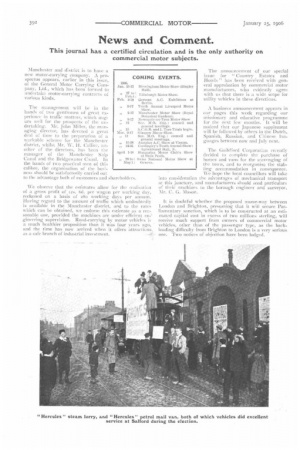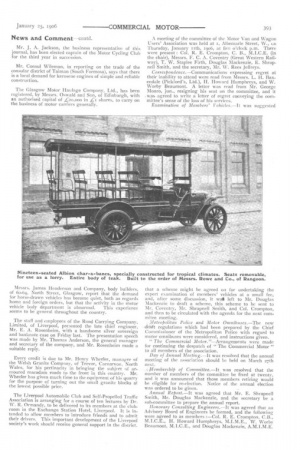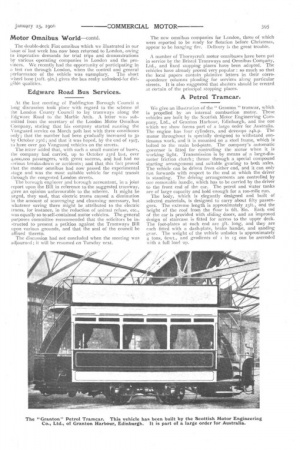News and Comment.
Page 4

Page 5

Page 7

If you've noticed an error in this article please click here to report it so we can fix it.
This journal has a certified circulation and is the only authority on commercial motor subjects.
Manchester and districl is to have a new motor-carrying company. A prospectus appears, earlier in this issue, of the General Motor Carrying Company., Ltd., which has been formed to undertako tnotor-carrying contracts of various kinds.
The management will be in the hands of two gentlemen of great experience in traffic matters, which augurs well for the prospects or the undertaking. Mr. John Miller, the managing director, has devoted a great dual of time to the preparation of a workable scheme for the Manchester district, whilst Mr. W. H. Collie;-, another of the directors, has been the manager of the Manchester Sidp Canal and the Bridgewater Canal. In the hands of two practical men o( this calibre, the organisation of the business should be satisfactorily carried out to the advantage both of customers and shareholders. 1,1 W.e observe that the estimates allow for the realisaticn of a gross profit of 125. bd, per wagon per working day, reckoned on a basis of 28;) working days per a11111011. Having regard to the amount of traffic xvhich undoubtedly is available in the Manchester district, and to the rates which can be obtained, we endorse this estimate as a rel:sonable one, provided the machines are under efficient engineering supervision. Road-carrying hv motor vehicles is a much healthier proposition than it was four years ago, and the time has now arrived when it offers attractions. as a safe branch of industrial investment.
The announer:loin of our special issue for " Country Estates and Hotels " has been received with general approbation by commercial motor manufacturers, who evidently agree with us that there is it wide scope for utility vehicles in these directions.
A busines announcement appears in our pages this week regarding our missionary and educative programme for the next few months. it will lie noticed that our Japanese supplement will be followed by others in the Dutch, Spanish, Russian, and Chinese languages between now and July next.
The Guildford Corporation recently decided to eemplete the purchase of horses and vans for the scavenging of the town, and to reorganise the stabling accommodation in consequence. We hope the local councillors ‘vill take into consideration the advantages of mechanical transport at this juncture, and manufacturers should send particulars oF their machines to the borough engineer and surveyor, Mr. C. G. Mason.
It is doubtful whether the proposed moror-war between London and Brighton, presuming that it will secure Parliamentary sanction, which is to be constructed at an estimated capital cost in excess of two millions sterling, will receive much support from owners of commercial motor vehicles, other than of the passenger type, as the backloading difficulty from Brighton to London is a very serious one. Two notices of objection have been lodged.
Mr. J. A. Jackson, the business representative of this journal, has been elected captain of the Motor Cycling Club for the third year in succession.
Mr. Consul Wileman, in reporting on the trade of the consular district of Taiman (South Formosa), says that there is a local demand for kerosene engines of simple and reliable construction.
The Glasgow Motor Haulage Company, Ltd., has been registered, by Messrs. Oswald and Son, of Edinburgh, with an authorised capital of £20,000 in Act shares, to carry on the business of motor carriers generally.
Messrs. James Henderson and Company, body builders, of 6o-o4, North Street, Glasgow, report that the demand for horse-drawn vehicles has become quiet, both as regards home and foreign orders, but that the activity in the motor vehicle body department is abnormal. This experience seems to be general throughout the country.
The staff and employees of the Road Carrying Company, Limited, of Liverpool, prelented the late chief engineer, Mr. E. A. Rosenheim, with a handsome silver sovereign and banknote case on Friday last. The presentation speech was made by Mr. Thomas Anderson, the general manager and secretary of the company, and Mr. Rosenheim made a suitable reply.
Every credit is due to Mr. Henry Wheeler, manager of the Welsh Granite Company, of Trevor, Carnarvon. North Wales, for his pertinacity in bringing the subject cff arnioured macadam roads to the front in this country. Mr. Wheeler has given much time to the equipment of his quarry for the purpose of turning out the small granite blocks at the lowest possible price.
The Liverpool Automobile Club and Self-Propelled Traffic Association is arranging for a course of ten lectures by Dr. W. R. Ormandy, to be delivered to its members at the clubroom in the Exchange Station Hotel, Liverpool. It is intended to allow members to introduce friends and to admit their drivers. This important development of the Liverpool society's work should receive general support in the district. A meeting of the committee of the Motor Van and Wagon Users' Association was held at r, Albemarle Street, W., on Thursday, January nth, 1906, at live o'clock p.m. There were present : Col. R. E. Crompton, C. B., M.I.C.E. (in the chair), Messrs. F. C. A. Coventry (Great Western Railway), T. W. Staple° Firth, Douglas Mackenzie, E. Shrapnel' Smith, and the secretary, Mr. W. Rees Jeffrey's.
Correspondence.—Communications expressing regret at their inability to attend were read from Messrs. L. H. Baxendale (Pickford's, Ltd.), H. Howard Humphreys, and W. Worby Beaumont, A letter was read from Mr. George Monro, jun., resigning his seat on the committee, and it was agreed to write a letter of regret conveying the committee's sense of the loss of his services.
Examination of Members' l'ehirles.—It was suggested that a scheme might be agreed on for undertaking the expert examination of members' vehicles at a small fee, and, after some discussion, it wai left to Mr. Douglas Mackenzie to draft a scheme, this scheme to be sent to Mr. Coventry, Mr. Shrapnel' Smith, and Col. Crompton, and then to be circulated with the agenda for the next commi tee meeting.
Metropolitan Police and Motor Omnibuses.—The new xtrialt regulations which had been prepared by the Chief Commissioner of the Metropolitan Police with regard to motor omnibuses were considered, and instructions given. " The Commercial Motor."—Arrangements were made for continuing the despatch of "The Commercial Motor " to all members of the association.
Day of Annual Meeting.—It was resolved that the annual meeting of the association should be held on March 27th next.
,Mentliership of Committee. —It was resolved that the number of members of the committee be fixed at twenty, and it was announced that those members retiring would he eligible for re-election. Notice of the annual election was ordered to be given.
Annual RePort.-1t was agreed that Mr. E. Shrapnel' Smith, Mr. Douglas Mackenzie, and the secretary be a sub-committee to prepare the annual report.
Honorary Consulting Engineers.—It was agreed that an Advisory Board of Engineers be formed, and the following were agreed to as members :—Col. R. E. Crompton, C.B., M.I.C.E., H. Howard Humphreys, M.I.M.E., W. Worby Beaumont, M.I.C.E., and Douglas Mackenzie, A.M.I.M.E.
The double-deck Fiat omnibus which we illustrated in our issue of last week has now been returned to London, owing to imperative demands for trial trips and demonstrations by various operating companies in London and the provinces. We recently had the opportunity of participating in a test run through London, when the control and general performance of the vehicle was exemplary. The short wheel base (ioft. 9in.) gives the bus really unlooked-for dirigible qualities.
Edgware Road Bus Services.
At the last meeting of Paddington Borough Council a long discussion took place with regard to the scheme of the London County Council to lay tramways along the Edgware Road to the Marble Arch. A letter was submitted from the secretary of the London Motor Omnibus Company, stating that his company started running the Vanguard service on March 30th last with three omnibuses only; that the number had been gradually increased to so by October 23rd; and that it was hoped, by the end of i9o7, to have over soo Vanguard vehicles on the streets.
The letter added that, with such a small number of buses, the company had carried, up to October 23rd last, over 4,000e000 passengers, with great success, and had had no serious breaks-down or accidents; and that this fact proved that the motor omnibus had now passed the experimental stage and was the most suitable vehicle for rapid transit through the congested London streets.
The borough engineer and borough accountant, in a joint report upon the Bill in reference to the suggested tramway, gave an opinion unfavourable to the scheme. It might be urged, they said, that electric trams caused a diminution in the amount of scavenging and cleansing necessary, but whatever saving there might be attributed to the electric trams, for instance, in the reduction of animal refuse, etc., was equally so to self-contained motor vehicles. The general purposes committee recommended that the solicitors be in.4tructed to present a petition against the Tramways Bill upon various grounds, and that the seal of the council be a ffi xed thereto.
The discussion had not concluded when the meeting was adjourned; it will be resumed on Tuesday next. The new omnibus companies for London, three of which were reported to be ready for flotation before Christmas, appear to be hanging fire. Delivery is the great trouble.
A number of Thornycroft motor omnibuses have been put in service by the Bristol Tramways and Omnibus Company, Ltd., and fixed stopping places have been adopted. The vehicles have already proved very popular : so much so that the local papers contain plaintive letters in their corree spondence columns pleading for services along particular streets. It is also suggested that sheiters should be erected at certain of the principal stopping places.
A Petrol Tramcar.
We give an illustration of the " Cr'ranton " tramcar, which is propelled by an internal combustion motor. These vehicles are built by the Scottish Motor Engineering Company, Ltd., of Granton Harbour, Edinburgh, and the one which we show forms part of a large order for Australia. The engine has four cylinders, and deveteps 24h.p. The motor throughout is specially designed to withstand continuous work, and it is mounted on a steel frame, which is bolted to the main bed-piate. The company's automatic governor is fitted for controlling the motor when it is working light. Transmission is by means of a large-diameter friction clutch; thence through a special compound starting arrangement and suitable gearing to I3oth axles. The vehicle can be driven from either end, and it can only run forwards with respect to the end at which the driver is standing. The driving arrangements are controlled by one removable handle, which has to be carried by the driver to the front end of the car. The petrol and water tanks are of large capacity and hold enough for a too-mile run. The body, which is elegantly designed and built of selected materials, is designed to carry about fifty passengers. The extreme length is approximately 23ft., and the height of the roof from the floor is 6ft. Sin. Each end of the car is erovided with sliding doors, and an improved design of staircase is fitted for access to the upper deck. The foot-plates at each end are 5ft. long, and they are each fitted with a dash-plate, brake handle, and sanding gear. The weight of the vehicle unladen is approximately 4 tons, 6cwt., and gradients of m in 15 can be ascended with a full load up.
















